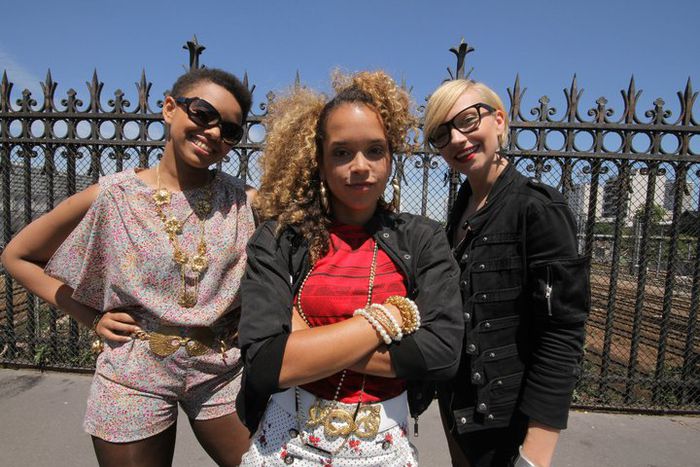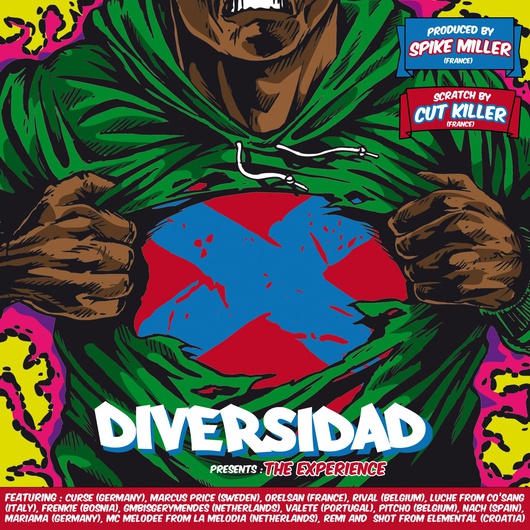
What happens when you mix 20 European hip-hop artists up
Published on
Translation by:
Danielle FarrellDiversidad, diversité, diversity, diversità, pазноврсност, raznovrsnost, diversidade...all in the name of an urban culture project supported by the European institutions, no less! A Paris-based Bosnian journalist meets the raw talent of European hip-hop, who collaborated on an album in Brussels for release in February 2011
It's a rather calm Friday afternoon at the Centquatre ('104'), the cultural centre conceived three years ago in a working-class area in the north east of Paris. The centre continues to feed the debate. Around twenty hip-hop artists, rappers, singers and beat-makers from twelve different European countries, involved in the musical project Diversidad, are waiting for rehearsal. Some of them are sleeping on the sofas, others are giving interviews to journalists.
Meet Frenkie and Orelsan, Bosnian and French rappers
 I've just woken up Frenkie, a Bosnian rapper. Nevertheless he's in good spirits and is ready to talk straight away. 'When they offered me the opportunity to participate in this project, I jumped at the chance. I've put my career aside so I can invest myself 100% in Diversidad. And I wasn't mistaken! It's an incredible experience, the perfect opportunity to become known to a European audience.' What Frenkie doesn't tell me (but which I find in the making-of of the recording) is that he is also an amateur beer brewer; beer being the 'fifth element of hip-hop', according to a man who drank fifteen on the first day of recording!
I've just woken up Frenkie, a Bosnian rapper. Nevertheless he's in good spirits and is ready to talk straight away. 'When they offered me the opportunity to participate in this project, I jumped at the chance. I've put my career aside so I can invest myself 100% in Diversidad. And I wasn't mistaken! It's an incredible experience, the perfect opportunity to become known to a European audience.' What Frenkie doesn't tell me (but which I find in the making-of of the recording) is that he is also an amateur beer brewer; beer being the 'fifth element of hip-hop', according to a man who drank fifteen on the first day of recording!
Orelsan, a French rapper well known for his verbal mischief, joins us. He's very famous in France, and so is in high demand with local journalists. 'Is it not too boring answering the same questions from journalists all the time?' I throw at him, as I'm about to ask him (as so many others have) why he wanted to get involved in Diversidad. 'No, of course it's not a problem, this way I get to perfect my speech!' he laughs.
Rap and European institutions
The history of Diversidad starts with a single recorded in 2008, as part of the year for intercultural dialogue and under the aegis of the European Music Office, an organisation that represents the music sector in European institutions. It was so successful that the European commission decided to support a second edition of the project. But beyond all this history, beyond Europe, beyond cultural diversity, exchange, language barriers that have been overcome, Diversidad is above all an exceptional musical project. Twenty artists from twelve European countries spend ten days in a Brussels studio recording a fourteen-track album. The result incarnates perfectly the spirit of urban culture in contemporary Europe. Following its release in February, the artists will begin a tour of the main European festivals.
'An institution like the European commission can't buy us'
'At the very beginning, I didn't know what to expect,' explains Orelsan. 'I agreed to participate in the project when I learned that it would be financed by the European commission. In the end, everything went well. We were free to do what we wanted. Also there was a real bond between us participants. We're from different countries, we don't all speak the same language, but we have lots in common and we quickly understood each other. The duty of an institution like the European commission is to finance and assist in cultural projects, but that doesn't mean that they can buy us,' says Frenkie, summing up the strange fusion between the world of rap and European institutions.
United in Diversity!
As the rehearsal begins the atmosphere becomes relaxed. The first song The eXperience, which will also be the album opener, has already made way for an incredible energy. The lyrics are in English and French, but also Bosnian, Croatian, Portuguese, Swedish and German and, unless you are a confirmed polyglot, you couldn't understand everything. Other songs follow. Listening to Cooking in the Pot, a sort of dialogue between Swedish artist Marcus Price, and Orelsan who replies to him in French, you understand to what extent entertainment and work are inseparable in the European collective.
Mariama is a German artist who sings in English. When she arrives on the scene with her guitar to sing On my Way, the few spectators at the rehearsal are overwhelmed by her voice. It leaves you gaping. Another girl in the project, Remi from Croatian group Elemental, has an exceptional impact; a mix of radical force and nervous charm which emanates from her voice and her gestures. Once on the scene, all eyes are on her. But despite the diversity and the strong personalities which make up the group, once on the scene, the artists give off the image of a well-bonded group. Would the language of hip-hop bend the Tower of Babel?
Watch this space
The album: 11 February around Europe
The tour: 13 January at the Eurosonic Festival in Groningen, Holland. 21 May in Vienna, Austria, then at all European summer festivals
The exhibition: A graffiti exhibition will be created in several European capitals in the summer of 2011
Translated from Diversidad : quand le hip-hop réunit l'Europe



